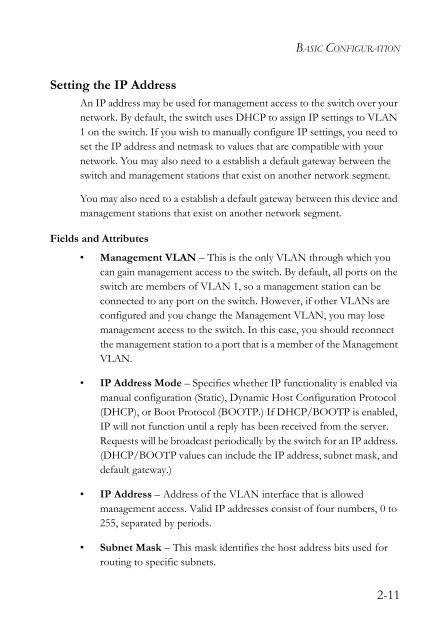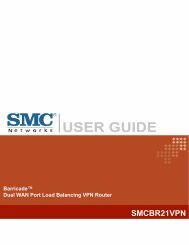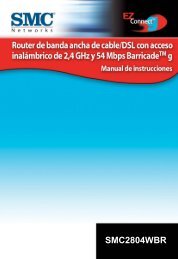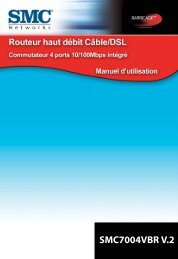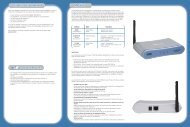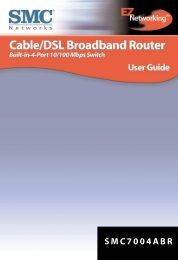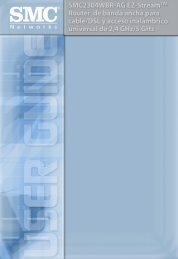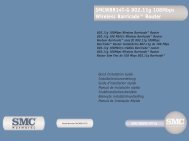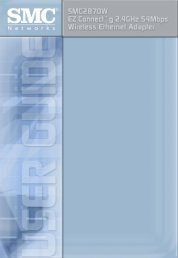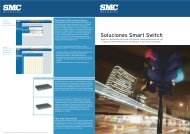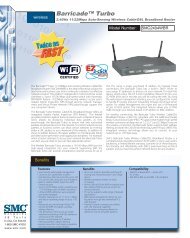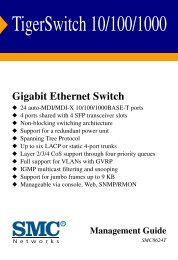- Page 1: TigerAccess Extended Ethernet Syste
- Page 4 and 5: Information furnished by SMC Networ
- Page 6 and 7: CONTENTS ii Saving or Restoring Con
- Page 8 and 9: CONTENTS iv Command Line Processing
- Page 10 and 11: CONTENTS vi Address Table Commands
- Page 12 and 13: CONTENTS viii efm reset . . . . . .
- Page 14 and 15: SWITCH MANAGEMENT 1-2 • Set usern
- Page 16 and 17: SWITCH MANAGEMENT 1-4 Notes: 1. Whe
- Page 18 and 19: SWITCH MANAGEMENT Setting Passwords
- Page 20 and 21: SWITCH MANAGEMENT 1-8 Before you ca
- Page 22 and 23: SWITCH MANAGEMENT 1-10 6. Save your
- Page 24 and 25: SWITCH MANAGEMENT 1-12 2. In order
- Page 26 and 27: SWITCH MANAGEMENT 1-14 The followin
- Page 28 and 29: SWITCH MANAGEMENT 1-16 Function Par
- Page 30 and 31: CONFIGURING THE SWITCH 2-2 3. If th
- Page 32 and 33: CONFIGURING THE SWITCH Configuratio
- Page 34 and 35: CONFIGURING THE SWITCH 2-6 Menu Por
- Page 36 and 37: CONFIGURING THE SWITCH 2-8 Menu Des
- Page 40 and 41: CONFIGURING THE SWITCH 2-12 • Gat
- Page 42 and 43: CONFIGURING THE SWITCH Renewing DCH
- Page 44 and 45: CONFIGURING THE SWITCH 2-16 • Num
- Page 46 and 47: CONFIGURING THE SWITCH 2-18 To star
- Page 48 and 49: CONFIGURING THE SWITCH Setting the
- Page 50 and 51: CONFIGURING THE SWITCH Reset Web In
- Page 52 and 53: CONFIGURING THE SWITCH Command Line
- Page 54 and 55: CONFIGURING THE SWITCH Port Configu
- Page 56 and 57: CONFIGURING THE SWITCH Configuring
- Page 58 and 59: CONFIGURING THE SWITCH Command Line
- Page 60 and 61: CONFIGURING THE SWITCH Command Line
- Page 62 and 63: CONFIGURING THE SWITCH 2-34 For exa
- Page 64 and 65: CONFIGURING THE SWITCH Changing the
- Page 66 and 67: CONFIGURING THE SWITCH 2-38 • Pri
- Page 68 and 69: CONFIGURING THE SWITCH Configuring
- Page 70 and 71: CONFIGURING THE SWITCH 2-42 • Pat
- Page 72 and 73: CONFIGURING THE SWITCH Web Interfac
- Page 74 and 75: CONFIGURING THE SWITCH Assigning Po
- Page 76 and 77: CONFIGURING THE SWITCH Enabling or
- Page 78 and 79: CONFIGURING THE SWITCH Displaying C
- Page 80 and 81: CONFIGURING THE SWITCH Creating VLA
- Page 82 and 83: CONFIGURING THE SWITCH Web Interfac
- Page 84 and 85: CONFIGURING THE SWITCH Configuring
- Page 86 and 87: CONFIGURING THE SWITCH 2-58 • Mod
- Page 88 and 89:
CONFIGURING THE SWITCH 2-60 Downlin
- Page 90 and 91:
CONFIGURING THE SWITCH Command Line
- Page 92 and 93:
CONFIGURING THE SWITCH Web Interfac
- Page 94 and 95:
CONFIGURING THE SWITCH Fields and A
- Page 96 and 97:
CONFIGURING THE SWITCH Web Interfac
- Page 98 and 99:
CONFIGURING THE SWITCH Mapping IP P
- Page 100 and 101:
CONFIGURING THE SWITCH Command Line
- Page 102 and 103:
CONFIGURING THE SWITCH Web Interfac
- Page 104 and 105:
CONFIGURING THE SWITCH Web Interfac
- Page 106 and 107:
CONFIGURING THE SWITCH Port Trunk C
- Page 108 and 109:
CONFIGURING THE SWITCH Command Line
- Page 110 and 111:
CONFIGURING THE SWITCH Setting Comm
- Page 112 and 113:
CONFIGURING THE SWITCH Multicast Co
- Page 114 and 115:
CONFIGURING THE SWITCH 2-86 • IGM
- Page 116 and 117:
CONFIGURING THE SWITCH Web Interfac
- Page 118 and 119:
CONFIGURING THE SWITCH Displaying P
- Page 120 and 121:
CONFIGURING THE SWITCH Web Interfac
- Page 122 and 123:
CONFIGURING THE SWITCH Command Line
- Page 124 and 125:
CONFIGURING THE SWITCH Web Interfac
- Page 126 and 127:
CONFIGURING THE SWITCH 2-98 Notes:
- Page 128 and 129:
CONFIGURING THE SWITCH Fields and A
- Page 130 and 131:
CONFIGURING THE SWITCH 2-102 • Do
- Page 132 and 133:
CONFIGURING THE SWITCH 2-104 Web In
- Page 134 and 135:
CONFIGURING THE SWITCH Displaying V
- Page 136 and 137:
CONFIGURING THE SWITCH 2-108
- Page 138 and 139:
COMMAND LINE INTERFACE 3-2 2. Enter
- Page 140 and 141:
COMMAND LINE INTERFACE 3-4 You can
- Page 142 and 143:
COMMAND LINE INTERFACE Partial Keyw
- Page 144 and 145:
COMMAND LINE INTERFACE 3-8 To enter
- Page 146 and 147:
COMMAND LINE INTERFACE Command Grou
- Page 148 and 149:
COMMAND LINE INTERFACE General Comm
- Page 150 and 151:
COMMAND LINE INTERFACE disable 3-14
- Page 152 and 153:
COMMAND LINE INTERFACE reload 3-16
- Page 154 and 155:
COMMAND LINE INTERFACE quit 3-18 Ex
- Page 156 and 157:
COMMAND LINE INTERFACE 3-20 Syntax
- Page 158 and 159:
COMMAND LINE INTERFACE delete 3-22
- Page 160 and 161:
COMMAND LINE INTERFACE 3-24 Example
- Page 162 and 163:
COMMAND LINE INTERFACE System Manag
- Page 164 and 165:
COMMAND LINE INTERFACE username 3-2
- Page 166 and 167:
COMMAND LINE INTERFACE 3-30 Command
- Page 168 and 169:
COMMAND LINE INTERFACE 3-32 Command
- Page 170 and 171:
COMMAND LINE INTERFACE 3-34 Default
- Page 172 and 173:
COMMAND LINE INTERFACE show running
- Page 174 and 175:
COMMAND LINE INTERFACE show version
- Page 176 and 177:
COMMAND LINE INTERFACE 3-40 • rad
- Page 178 and 179:
COMMAND LINE INTERFACE radius-serve
- Page 180 and 181:
COMMAND LINE INTERFACE SNMP Command
- Page 182 and 183:
COMMAND LINE INTERFACE snmp-server
- Page 184 and 185:
COMMAND LINE INTERFACE 3-48 The snm
- Page 186 and 187:
COMMAND LINE INTERFACE 3-50 Command
- Page 188 and 189:
COMMAND LINE INTERFACE ip address 3
- Page 190 and 191:
COMMAND LINE INTERFACE 3-54 Example
- Page 192 and 193:
COMMAND LINE INTERFACE ping 3-56 Ex
- Page 194 and 195:
COMMAND LINE INTERFACE Line Command
- Page 196 and 197:
COMMAND LINE INTERFACE password 3-6
- Page 198 and 199:
COMMAND LINE INTERFACE 3-62 Command
- Page 200 and 201:
COMMAND LINE INTERFACE databits 3-6
- Page 202 and 203:
COMMAND LINE INTERFACE stopbits 3-6
- Page 204 and 205:
COMMAND LINE INTERFACE Interface Co
- Page 206 and 207:
COMMAND LINE INTERFACE 3-70 Command
- Page 208 and 209:
COMMAND LINE INTERFACE capabilities
- Page 210 and 211:
COMMAND LINE INTERFACE clear counte
- Page 212 and 213:
COMMAND LINE INTERFACE 3-76 Example
- Page 214 and 215:
COMMAND LINE INTERFACE show interfa
- Page 216 and 217:
COMMAND LINE INTERFACE 3-80 • bri
- Page 218 and 219:
COMMAND LINE INTERFACE clear bridge
- Page 220 and 221:
COMMAND LINE INTERFACE port securit
- Page 222 and 223:
COMMAND LINE INTERFACE bridge spann
- Page 224 and 225:
COMMAND LINE INTERFACE bridge hello
- Page 226 and 227:
COMMAND LINE INTERFACE bridge prior
- Page 228 and 229:
COMMAND LINE INTERFACE bridge-group
- Page 230 and 231:
COMMAND LINE INTERFACE show bridge
- Page 232 and 233:
COMMAND LINE INTERFACE 3-96 Command
- Page 234 and 235:
COMMAND LINE INTERFACE 3-98 Example
- Page 236 and 237:
COMMAND LINE INTERFACE switchport a
- Page 238 and 239:
COMMAND LINE INTERFACE 3-102 Comman
- Page 240 and 241:
COMMAND LINE INTERFACE show vlan 3-
- Page 242 and 243:
COMMAND LINE INTERFACE 3-106 Privat
- Page 244 and 245:
COMMAND LINE INTERFACE GVRP and Bri
- Page 246 and 247:
COMMAND LINE INTERFACE 3-110 Exampl
- Page 248 and 249:
COMMAND LINE INTERFACE 3-112 Exampl
- Page 250 and 251:
COMMAND LINE INTERFACE IGMP Snoopin
- Page 252 and 253:
COMMAND LINE INTERFACE 3-116 no ip
- Page 254 and 255:
COMMAND LINE INTERFACE 3-118 • br
- Page 256 and 257:
COMMAND LINE INTERFACE 3-120 second
- Page 258 and 259:
COMMAND LINE INTERFACE ip igmp snoo
- Page 260 and 261:
COMMAND LINE INTERFACE Priority Com
- Page 262 and 263:
COMMAND LINE INTERFACE 3-126 incomi
- Page 264 and 265:
COMMAND LINE INTERFACE 3-128 Defaul
- Page 266 and 267:
COMMAND LINE INTERFACE 3-130 Exampl
- Page 268 and 269:
COMMAND LINE INTERFACE 3-132 Comman
- Page 270 and 271:
COMMAND LINE INTERFACE map ip dscp
- Page 272 and 273:
COMMAND LINE INTERFACE show map ip
- Page 274 and 275:
COMMAND LINE INTERFACE Mirror Port
- Page 276 and 277:
COMMAND LINE INTERFACE show port mo
- Page 278 and 279:
COMMAND LINE INTERFACE interface po
- Page 280 and 281:
COMMAND LINE INTERFACE lacp 3-144 E
- Page 282 and 283:
COMMAND LINE INTERFACE VDSL Command
- Page 284 and 285:
COMMAND LINE INTERFACE 3-148 Comman
- Page 286 and 287:
COMMAND LINE INTERFACE efm define u
- Page 288 and 289:
COMMAND LINE INTERFACE efm rdl 3-15
- Page 290 and 291:
COMMAND LINE INTERFACE show control
- Page 292 and 293:
COMMAND LINE INTERFACE show control
- Page 294 and 295:
COMMAND LINE INTERFACE 3-158 Comman
- Page 296 and 297:
COMMAND LINE INTERFACE 3-160 Note:
- Page 298 and 299:
COMMAND LINE INTERFACE show control
- Page 300 and 301:
COMMAND LINE INTERFACE rate-limit (
- Page 302 and 303:
TROUBLESHOOTING Upgrading Firmware
- Page 304 and 305:
TROUBLESHOOTING A-4 10. After the f
- Page 306 and 307:
PIN ASSIGNMENTS Console Port to 9-P
- Page 308 and 309:
GLOSSARY Bandwidth The difference b
- Page 310 and 311:
GLOSSARY LAN Segment LED Glossary-4
- Page 312 and 313:
GLOSSARY Glossary-6
- Page 314:
INDEX R RADIUS, configuring logon a


